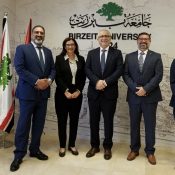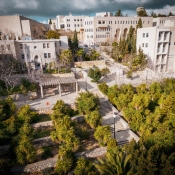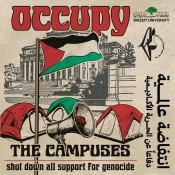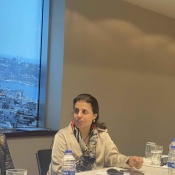National Initiative on Media Meets Virtually as Gaza Partners Blocked
Birzeit University's Media Development Center held on August 26, 2015 the annual meeting of the National Initiative to Develop Media in Palestine, with the participation of representatives from over 50 national initiative member institutions in the West Bank and the Gaza Strip. The event was held via Skype after Israel denied Gaza’s participants entry permits into the West Bank.
Vice President for Advancement and Communications Ghassan al-Khatib delivered a speech on behalf of President Abdul Latif Abu Hijleh, affirming the meeting's importance in reinforcing the university’s leading role.
“Birzeit University has and will continue to unify all Palestinians, through its students, academic and administrative staff, and community work, by recognizing a complete Palestinian state,” he said.
Al-Khatib said that the university has a branch of its Media Development Center in the Gaza Strip. The center is one of others, including the Women’s Studies Center, the Development Studies Program, the Institute of Law and laboratories, that cover the West Bank and the Gaza Strip and targets Palestinians In Israel.
Moreover, the media center has recently begun to offer its media services on a regional level. Several days earlier, the center had concluded two workshops in Egypt and Lebanon, an accomplishment that is part of the effort to transmit a national message both locally and globally using professional and state-of-the-art tools.
Head of the Palestinian Journalists’ Syndicate Abdul Nasser al-Najjar praised the Palestinian media sector, which has made national sacrifices as its journalists have been killed, injured and imprisoned.
He explained that the national initiative to develop media is a project led by the Media Development Center in cooperation with the Journalists Syndicate, the Ministry of Information and more than 50 other institutions working in media sector, to advance the Palestinian media, boost freedoms, and improve performance based on international standards for media freedom.
Director of the Birzeit University Media Development Center Nibal Thawabta said the center began work on the national initiative in 2012, based on a baseline study on media in Palestine conducted in partnership with UNESCO.
“The initiative is divided into nine components supervised by nine committees, which are composed of the national team in the West Bank and the Gaza Strip,” she said. “Five components were selected to be the focus of our work in the year 2015 - namely legal reform, academic development, organizing the media training sector, gender, and developing the infrastructure. Meanwhile, the rest of the components, including media and society, public media service, an integrated environment to protect journalists, and self-regulation of the media sector were scheduled to be addressed during the year 2016."
The meeting was held in five sessions. The first session, which discussed legal reform, was moderated by Omar Nazzal and presented panelists Mahmoud Dodeen, Yihya Shuqair, Saleh Masharqa and Tawfiq Abu Shomar from Gaza.
The second session was moderated by Ahmad Hamad from Gaza and introduced Nibal Thawabta and Ma’an Idees, who discussed the national initiative's academic development.
Meanwhile, the third session discussed the issue of media training and introduced Rima al-Ajrami, Nahed Abu Teima and Tamer AlMishal from Gaza. During the fourth session, Nahed Abu Teima, Lubna al-Ashqar, Majed Ma’rouf and Laila al-Mudalal in Gaza discussed the issue of gender in media, moderated by Karem Nashwan.
The fifth and last session addressed the initiative’s infrastructure. Emad al-Asfar, Mammon Matar, and Engineer Samer Ali from the Ministry of Information technology were introduced as the panelists and the session was moderated by Tahsen al-Astal from Gaza.
The meeting concluded with a presentation showcasing the initiative’s achievements made by Emad al-Asfar, Saleh Masharqa and Abeer Ismail. Meanwhile, Buthaina al-Samiri and Samia al-Zubidi in Gaza presented the initiative’s plan for the last quarter of 2015.







